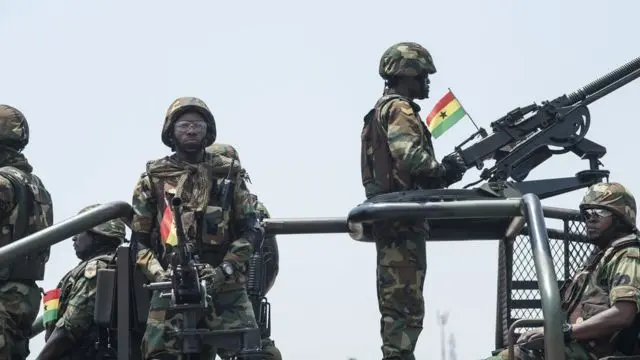- P.O. Box: 11482 Yaoundé, Cameroon; Headquarters: Efoulan, Yaoundé 3
- contact@caessinternational.org

With the rising terrorist threat in the Sahel, Ghana is more than ever on the verge of becoming a favorable ground for jihadist groups. Already present in Côte d’Ivoire and Togo, the Sahelian Katibas now pose a serious threat to Ghana, signaling the end of the inviolability of Ghanaian territory. Indeed, the proximity of the Sahelian terrorist groups to Ghana’s borders marks an upcoming security rupture. This spread of the terrorist threat is facilitated by the porous borders stretching from the Cascades region in Burkina Faso to northern Ghana, making this area an ideal zone for armed groups operating in cross-border spaces, including northern Côte d’Ivoire.
In response to this worrying security situation, Ghanaian leaders are raising public awareness that jihadists already have a foothold in Ghana and are gradually establishing themselves. To this end, the Ministry of National Security launched the national awareness campaign “See Something, Say Something,” aimed at encouraging citizens to report any suspicious activity to security services. This campaign comes at a time when the country is experiencing social unrest that has sparked popular mobilizations in major cities and on social networks, without a favorable response from the government. Although often presented as an economic model due to its growth and the strong rise in GDP since 2010, Ghana is witnessing an increase in millionaires alongside a stagnation in the number of poor people, with only 1.4% of national wealth allocated to social protection.
Moreover, there remains a feeling of distrust toward state institutions, the so-called corrupt political class, and security forces, who have committed abuses and human rights violations with impunity against protesters and journalists during the “FixTheCountry” movement. Jihadist groups exploit these social gaps affecting poor and marginalized communities by providing basic infrastructure and social services that the state fails to deliver. Given this alarming situation, Ghana has undertaken reforms in its administration and its defense and security apparatus. Accordingly, Ghanaian leaders have carried out:
An administrative redistricting;
A tighter territorial network;
A redeployment of new counterterrorism units in the northern border areas.
At the sub-regional level, Ghanaian leaders have implemented the “Accra Initiative,” which currently includes seven countries: Ghana, Côte d’Ivoire, Togo, Benin, Mali, Niger, and Burkina Faso. Additionally, after a long hesitation to contribute militarily to regional counterterrorism efforts in West Africa, Ghana now appears determined to engage militarily alongside its allies in conflict zones in Burkina Faso, Mali, and Niger.